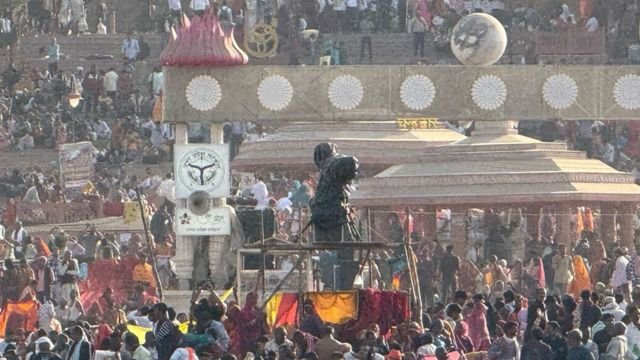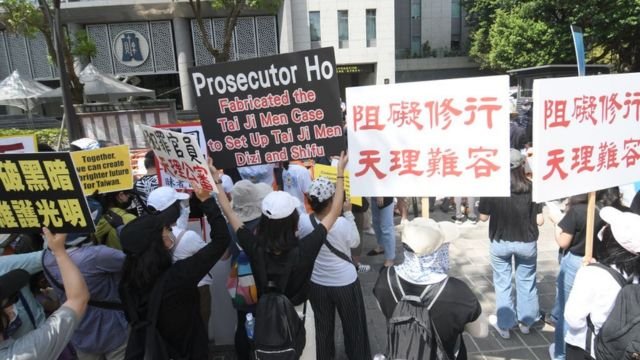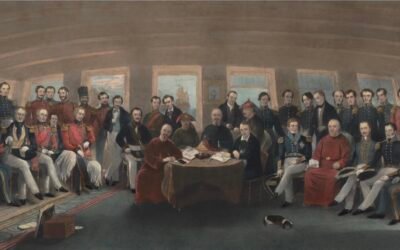Catholics and Hindus regard 2025 as a special year of repentance and atonement. Will 2025 in Taiwan also be a year for rendering justice to Tai Ji Men?
by Massimo Introvigne*
*A video paper presented at the conference “End State Persecution and Implement Transitional Justice: The Tai Ji Men Case as an Example,” organized in observance of 228 Peace Memorial Day, Taipei, February 28, 2025.
![Giotto (1266–1337), “Pope Bonifacius VIII [1230–1303] Proclaims the Jubilee of Year 1300,” the first modern Catholic Jubilee. Credits.](https://bitterwinter.org/wp-content/uploads/2025/02/BITTER-WINTER-48.jpg)
Those who visit Rome in 2025 notice unusual crowds and traffic, due to the fact that for the Catholic Church this is a Jubilee Year, i.e., a year devoted to repentance when, through certain practices including pilgrimages to Rome, Catholics may obtain a remission of their sins. Jubilees have a long tradition in the Catholic Church and the name and practice date back to Judaism where, in ancient times, every fifty years crops were not harvested, slaves were liberated, and debts were condoned to the poor.
There are similar practices in all religions. Earlier this month, my wife and I participated in the greatest pilgrimage on the Planet, the Kumbh Mela in India. This year, it was the “Maha Kumb,” the “Great Khumb,” which occurs every 144 years. It was attended by the record number of 250 million devotees. Similar to the Jubilees, pilgrims go to the River Ganges and immerse themselves there (as we did, too) to cleanse their sins.

For the Jubilee of the year 2000, Pope John Paul II called for a “purification of the memory.” He acknowledged that leaders of the Catholic Church during its long history made mistakes and committed crimes, and offered a public apology to the victims.
Countries commit crimes too and need a purification of the memory. In Taiwan, February 28 reminds Taiwanese of the crimes and human rights violations committed during the White Terror. Democratic countries are those who are able to recognize their past mistakes and apologize for them. In Taiwan, you can visit a museum devoted to the horrors of the White Terror, just as Germany has set up a museum in Nürnberg about the crimes of the Nazi era and has apologized for them. As opposite to this, discussing the crimes of the Stalin era is discouraged in Russia Historians who have uncovered horrific details about them have been put in jail under false pretexts.
While Taiwan should be applauded for acknowledging the crimes of February 28 and the White Terror, the acknowledgement alone is not enough to attest to a successful transition to a full-blown democracy. It is also necessary that effective measures are put in place to avoid that violations of human rights may occur again, that victims of past abuses are indemnified, and those responsible prosecuted.
In Taiwan, human rights violations occurred both during the Martial Law period, which ended in 1987, and in the subsequent post-authoritarian phase. One serious incident was the 1996 crackdown on religious and spiritual movements that had not supported the winning Kuomintang candidate in the presidential elections held that year. One of the victims of the crackdown was Tai Ji Men, whose Shifu (Grand Master), his wife, and two dizi (disciples) were detained. They were later found innocent, up to the Supreme Court.

However, as a by-product of the criminal case, an absurd and obnoxious tax persecution was launched against Tai Ji Men and continued even after the Supreme Court in 2007 had declared its defendants innocent of all charges, including tax evasion. Based on one of the fabricated tax bills, in 2020 land regarded as sacred by Tai Ji Men was seized, unsuccessfully auctioned off, and nationalized, generating widespread protests in Taiwan and abroad. The case remains unsolved to this day.
The Tai Ji Men case (which finds parallels in other serious cases of tax injustice in the island) proves that after the authoritarian and post-authoritarian periods transitional justice failed in Taiwan. The evil of authoritarianism and post-authoritarianism was acknowledged, which is a positive development, but was not fully dealt with, which is certainly less positive.
2025 is a Jubilee year for the Catholics and the Hindus, i.e., for billions of believers. A year for acknowledging past sins, repent, and rectify our wrongdoings. We call for a Jubilee year 2025 for Taiwan and Tai Ji Men, one when the injustice vested on it will be finally rectified. We call for truth and for justice. We call for restoring the honor of Tai Ji Men.

Massimo Introvigne (born June 14, 1955 in Rome) is an Italian sociologist of religions. He is the founder and managing director of the Center for Studies on New Religions (CESNUR), an international network of scholars who study new religious movements. Introvigne is the author of some 70 books and more than 100 articles in the field of sociology of religion. He was the main author of the Enciclopedia delle religioni in Italia (Encyclopedia of Religions in Italy). He is a member of the editorial board for the Interdisciplinary Journal of Research on Religion and of the executive board of University of California Press’ Nova Religio. From January 5 to December 31, 2011, he has served as the “Representative on combating racism, xenophobia and discrimination, with a special focus on discrimination against Christians and members of other religions” of the Organization for Security and Co-operation in Europe (OSCE). From 2012 to 2015 he served as chairperson of the Observatory of Religious Liberty, instituted by the Italian Ministry of Foreign Affairs in order to monitor problems of religious liberty on a worldwide scale.



